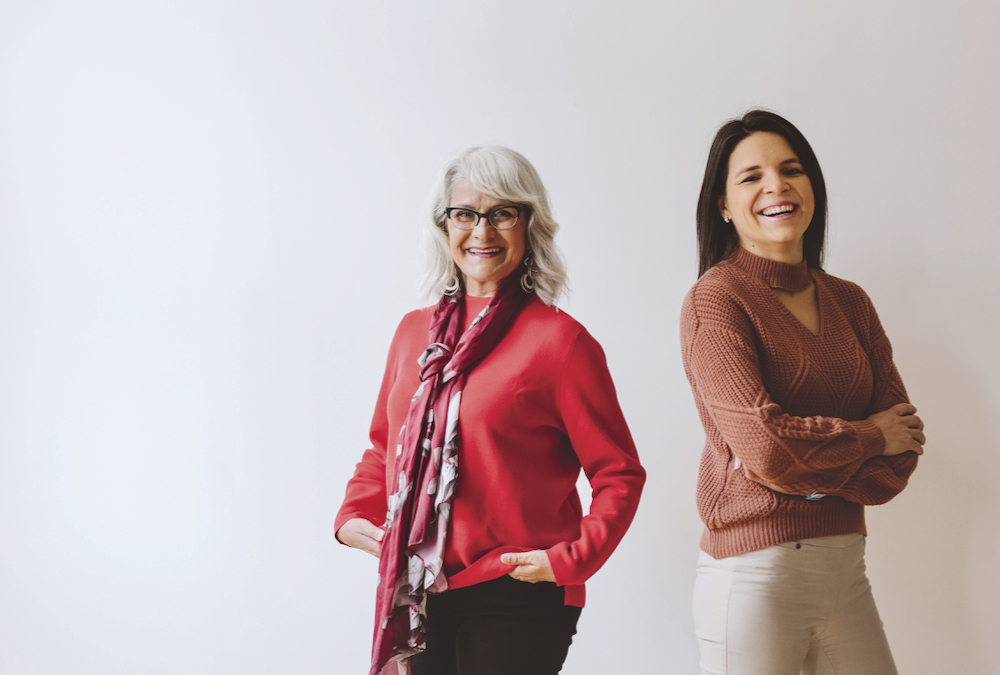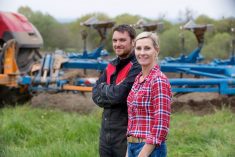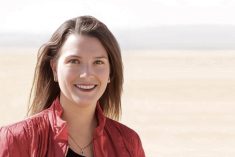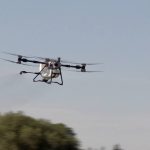Statistics show that women in agriculture face barriers and are under-represented in the industry. But if you are female AND you weren’t born in Canada AND you didn’t grow up on a farm, imagine how high the barriers are then.
But that may be beginning to change.
Entrepreneur Laura Lazo, who also serves as chair and co-founder of Manitoba Women in Agriculture and Food (MWAF) believes inclusion is contagious, and it’s only going to gather more steam in the agricultural industry.
Read Also
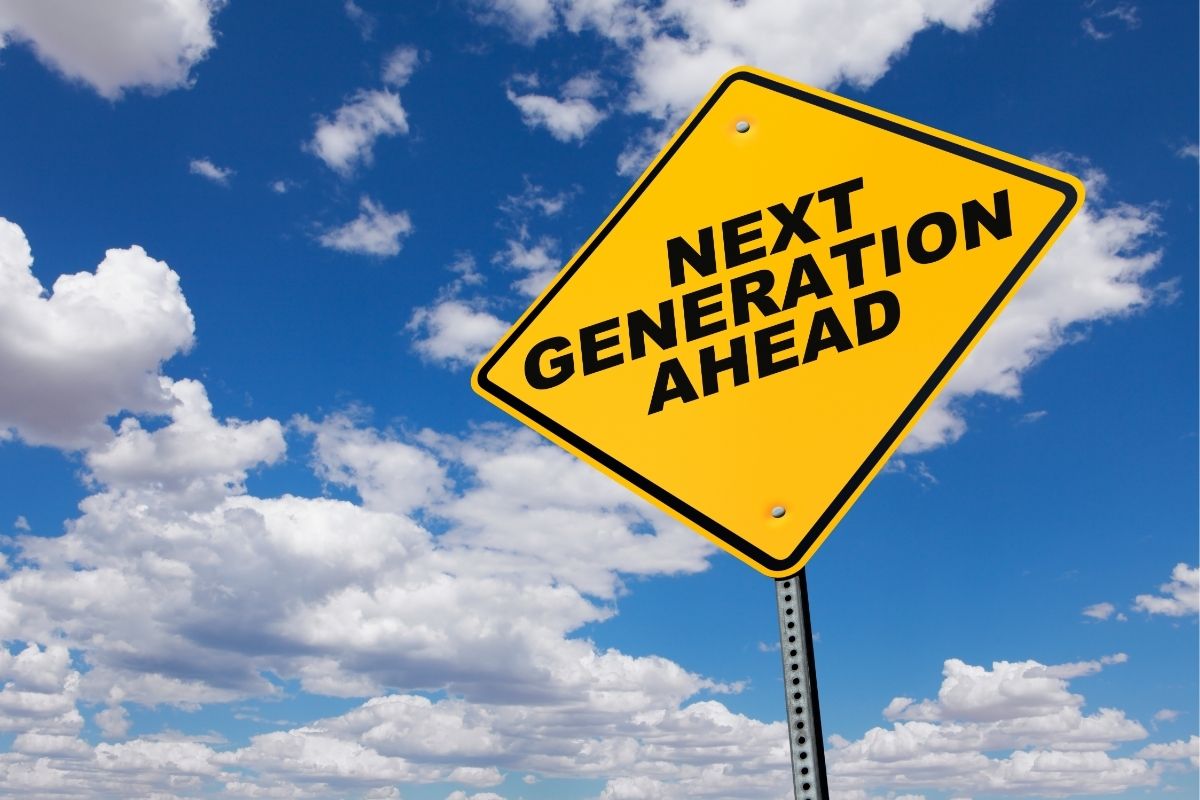
Sibling squeeze part 6: The emotional stakes of a family legacy
The final instalment in a six-part series exploring the challenges of sibling conflict and the effect it can have on…
“People are talking about it, conferences are organized around it,” Lazo says. “Companies are talking about it, and the industry knows that in order to meet business goals, it must attract more people from those untapped pools of talented women in under-represented groups.”
Believing that all women are equal regardless of their demographic category, MWAF has decided to work to advance them all equally.
MWAF not only works to connect women to farm and ag opportunities, but a key goal is to specifically advance women from under-represented groups. MWAF offers a variety of business and skills training and resources that encourage and support women entrepreneurs, and is now looking at how to help the industry embed DEI (Diversity, Equity and Inclusion) policies into their workplaces and hiring practices.
Recognizing barriers
It all began when Lazo met MWAF co-founder, Marijo Patino a few years ago and realized they had a lot in common. Both had grown up outside Canada, and both were in the process of establishing their own agricultural consulting companies. They also experienced challenges in attending industry training and events such as the Advancing Women in Agriculture Conference (AWC), which they knew were crucial to help them build their networks and businesses.
“The AWC is the perfect place to meet people and companies and to learn and make business connections but attending industry events can sometimes be a challenge without the financial support of an employer,” Lazo says.
Because they both knew plenty of women who faced similar challenges, they got together to see if they could find solutions.
“We knew many women, Canadian-born or not, who were experiencing barriers, and there were many reasons for that,” Lazo says. “If you are not a born-and-bred Canadian, you’re pretty much racialized. On top of that, if you don’t have a farming background, you don’t get the same job opportunities in the industry. If you are a certain age, you face ageism, which is true for everyone, not just those in agriculture.”
The two decided there was a need for a group dedicated to supporting all women who were involved, or wanting to be involved, in the agricultural industry. They began talking to other like-minded women, and within a month had recruited a board of directors, and established MWAF.

Still a lot to learn
Lazo and Patino soon realized they had a lot to learn about governance and organizational structure, so they consulted an industry development specialist with Manitoba Agriculture and Resource Development, who conducted a review of the new group and identified areas it needed to work on, helping them to access training and resources to learn more about running a registered, non-profit organization, which MWAF became.
It was a good start, and the group began small, with no funding except the money coming out of their own pockets. They created a webpage and started building a social media following. Patino also conducted a survey of the people they had already contacted who were interested in the group, to figure out what the focus of its services should be.
Priorities that arose included the need for networking events and professional development and training resources. In partnership with other organizations such as Farm Credit Canada, MWAF began to develop these resources, such as workshops in business plan development for women entrepreneurs in agriculture or other sectors.
The group arranged farm tours as networking and cultural events. “We wanted people that live in the city to get to know farmers and their farms, and establish a connection to educate people about agriculture,” Lazo says.
They also developed networking events like an annual general meeting (prior to COVID-19 restrictions) and a monthly virtual networking program called AgChat, hosted by leaders in the agricultural industry. A group of 17 farm women have been producing short videos for MWAF’s YouTube channel about life on the farm, intended to highlight farm women, and the culture and diversity of agriculture. The organization is also part of a Portage la Prairie working group that is developing a new concept that celebrates women in agriculture, community and diversity. It will consist of two parts, one a virtual event, and a farmers market with an ethnic component next summer.
Today, MWAF has a social media following of over 6,000 people and membership has been steadily growing, although a big aim for the group is to increase the number of both individual and corporate members in order to achieve its potential in the industry.
Working for all women in agriculture
MWAF is not a diversity group but an organization that fully embraces equality and inclusion and works for all women in agriculture regardless of their demographic categorization.
MWAF also represents innovation in agriculture in the sense that the founders did not grow up in Canada or have farm backgrounds, and the board and membership are fully diverse.
Lazo grew up in Argentina and currently runs her own human resources consulting company specializing in agriculture, while Patino, an economist by training, is working as an independent consultant for companies in the agri-food sector.
Lazo came to Canada in 1983 and completed a Masters and PhD at Dalhousie University, which is where she met her husband, John. She had never intended to stay in Canada; in fact, her plan was to return to Argentina to continue her work in marine biology, but when her husband was offered a faculty position at the University of Manitoba, they settled in Winnipeg.
After their son was born, Lazo worked for a while as a consultant in roles involving business and partnership development and public relations before accepting a position at the U of M’s faculty of agriculture and food sciences to manage its student placement programs. It was during this time that Lazo was first introduced to the Canadian agricultural industry.
Today, there is a group representing women in agriculture in every province across Canada and MWAF works with them, but what makes MWAF different is its focus.
“We specifically recognize under-represented women in one of our goals because they face stiffer barriers,” Lazo says.
“We are proud of our diversity. Our board and membership include women who are from Canada and otherwise, and with and without farming backgrounds. We also represent women that are entrepreneurs and corporate employees, as well as farm women. Our approach is to support all women in the agricultural sector regardless of their role because agriculture offers multiple opportunities in production, but also in products and service sectors for people from just about any discipline.”
Those opportunities, though, are not always equally available, especially to racialized women. This, says Lazo, is a detriment to the industry.
MWAF’s vision and direction reflects the diversity of backgrounds and outlooks of the people who make up the group.
“Some board members were not originally from Canada, but most of our members are,” Patino says.
Patino is an economist with more than 10 years of research experience working for governments, academia, and industries in agriculture, food and industrial development in Canada, the United States and Latin America. In 2014, she came to the University of Manitoba from her native Paraguay to complete a masters in Agribusiness and agricultural economics for a career in ag, but getting practical experience of Canadian farming and agriculture proved to be a major obstacle to her career aspiration to be a freelance researcher for projects related to agriculture and technology.
Where to get started?
Linda Zhou, MWAF’s director of planning and sustainability, currently works as a research analyst at Manitoba Agricultural Services Corporation. She also came as an international student from China to complete the same masters degree as Patino at the University of Manitoba. For Zhou, a major obstacle was a lack of understanding of not just Canadian agriculture, but Canadian culture in general, which meant it was hard for her to develop the understanding and confidence she needed to pursue opportunities.
“For anyone from a different culture, it’s hard because you don’t know where to go to get started,” Zhou says, adding a group of farmers offered her an entry-level job, which she took as an opportunity to gain experience, but many international students don’t get the same chance. “MWAF provides that platform to access opportunities and a wider network, whether it’s through a farm tour, or event or a webinar to add new skills. It’s very useful because it helps you see what people are doing, and be more confident, and that’s very important.”
It’s important that MWAF’s vision is not just bottom-up, but also top-down, adds Zhou, pointing to a recent AgChat webinar that was hosted by Trevor Heck, president of Syngenta Canada, a corporation that is working to incorporate DEI principles into its global workforce.
“We are showing that there is also a push for DEI from the top and that people at a high level in major corporations care about it,” Zhou says. “If the push is from both ends, we’re going to make things happen. If I had these kinds of opportunities while I was a student, I would have been more confident. MWAF is trying to get people into the industry faster and help them to level up easier.”
The need for more diversity
The 2017 Barton Report (a set of recommendations from the Federal Government’s Advisory Council on Economic Growth) has said that Canada could become the world’s second-largest agricultural exporter of safe, nutritious and sustainable food — it is currently fifth.
But to achieve that potential, it says, Canada needs more people.
Lazo believes that because MWAF has a good handle on diversity, it can play a key role in connecting employers with the human resources they need and provide DEI services.
“As we mature, we realize we can play a significant role in connecting people and industry stakeholders. We have a two-pronged approach,” Lazo says. “One is to support women, and the other is to support the industry by providing them with the kind of people and services they need, and to help them develop policies to attract and retain more women.”
MWAF has a constantly updated job board on its website to help employers and potential employees connect with each other, and is ready to do more, says Lazo, to assist the industry in matters around DEI. It’s important to understand, though, that the gender gap is not a “women-only” issue but has an impact on everyone, Lazo adds, which is why MWAF is keen to involve more men. “If a spouse, mother, sister or daughter cannot fulfill her ambitions, there are emotional and long-term economic impacts on the rest of the family,” she says. “Involving men in speaking about gender issues and taking actions that support women in corporations and businesses will help close the occupational and income gap.”
Progress being made, but slowly
There are signs of positive change. The federal government announced in its 2021 budget that it will provide $146.9 million over four years to support women entrepreneurs and announced a public consultation process to foster inclusivity in the Canadian financial sector.
Many major companies are looking at how they can incorporate the principles of DEI into their organizational culture and are investing in initiatives to attract more women and others from diverse groups to their workplaces.
“We don’t yet have a metric to be able to assess the degree of change but by word of mouth, or in speaking with companies, we know what they are doing individually, but we don’t know the extent of the transformation across the sector,” Lazo says. “I suspect that there is not a whole lot of actual measurable change.”
On a cultural level, in fact, there is still a lot of resistance to DEI. “People say that diversity is good, but saying and doing are not the same thing,” Lazo says. “Good will and positive thinking alone are not enough to change the status of things. It takes talking, and doing … but it is the way to a prosperous and competitive industry.”


